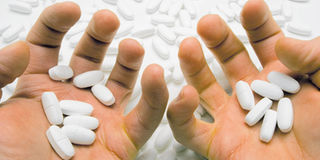Two pain killers linked with cardiac arrest, scientists warn

Diclofenac and Ibobrufen work by, among other ways, constricting blood vessels such as arteries, PHOTO | COURTESY
What you need to know:
- The scientists, who published the findings in the European Heart Journal- Cardiovascular Pharmacotherapy, have advised people to only take the drugs when prescribed by a medical doctor.
- However, in the East Africa region, both drugs are readily available over the counter—without a doctor’s prescription—and can also be administered to children.
Scientists have associated two painkillers—diclofenac and ibuprofen—with increased risk of cardiac arrest, in a study published last week. Cardiac arrest is when the heart stops pumping suddenly.
The scientists, who published the findings in the European Heart Journal- Cardiovascular Pharmacotherapy, have advised people to only take the drugs when prescribed by a medical doctor.
However, in the East Africa region, both drugs are readily available over the counter—without a doctor’s prescription—and can also be administered to children.
The researchers have also said that these findings should be treated with caution. “These are only associations and therefore any conclusion on causality should be made with caution,” reads part of the study.
The research warns that increased cardiovascular risk is a global concern because the drugs are widely used to relieve pain, reduce inflammation, and bring down a high temperature.
The author of the study, Prof Gunnar Gislason, from Copenhagen University Hospital Gentofte, Denmark said: “Allowing these drugs to be purchased without a prescription, and without any advice or restrictions, sends a message to the public that they must be safe.”
The study shows the use of any the use of pain killers classified as Non-steroidal anti-inflammatory drugs (NSAID) was associated with a 31 per cent increased risk of cardiac arrest.
The research shows that diclofenac is associated with a 50 per cent risk of cardiac arrest.
On the other hand, ibuprofen’s risk of causing a cardiac arrest is 31 per cent.
Professor Gislason said that the findings from the 10 year study are a “stark reminder that NSAIDs are not harmless.”
“Our study adds to the evidence about the adverse cardiovascular effects of NSAIDs and confirms that they should be taken seriously, and used only after consulting a healthcare professional. They should probably be avoided in patients with cardiovascular disease or many cardiovascular risk factors.”
People in East Africa, including Tanzania are exposed to these cardiovascular risks due to sedentary lifestyles characterised by a lot of sitting, bulging waistlines, and little physical exercise.
Professor Gislason said as such that the drugs should only be available at pharmacies, in limited quantities, and in low doses.
The drugs work by, among other ways, constricting blood vessels such as arteries, influence the clumping together of platelets in the blood which causes blood clots, increases fluid retention, and raises blood pressure.
Therefore, the researchers advise limiting ibuprofen to 1200 mg per day and avoiding diclofenac.
The study is titled: Non-steroidal anti-inflammatory drug use is associated with increased risk of out-of-hospital cardiac arrest: a nationwide case–time–control study.
It has investigated the link between the use of pain killers classified as Non-steroidal anti-inflammatory drugs (NSAID) with cardiac arrest.
Data analysed was on out-of-hospital cardiac arrest in Denmark between 2001 and 2010 as reported in the nationwide Danish Cardiac Arrest Registry.
It was collected on all redeemed prescriptions for NSAIDs from Danish pharmacies since 1995.
A total of 28 947 patients had an out-of-hospital cardiac arrest in Denmark during the ten year period. Of these, 3 376 were treated with an NSAID up to 30 days before the cardiac arrest.
How does cardiac arrest occur?
This happens when a person suddenly loses consciousness and stops breathing or stops breathing normally.
It is however, not the same as a heart attack. A heart attack is the sudden interruption to the blood supply to part of the heart muscle.
It is likely to cause chest pain and permanent damage to the heart.
The heart is still sending blood around the body and the person remains conscious and is still breathing. It is caused by a blockage that stops blood flow to the heart.




